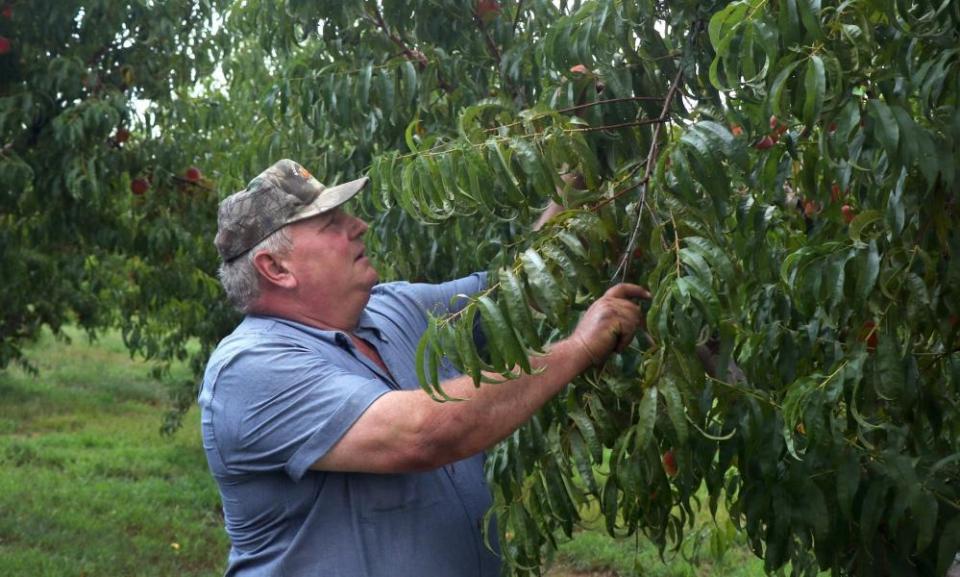Court overturns EPA approval of popular herbicide made by Monsanto

The Environmental Protection Agency (EPA) broke the law in approving agricultural weedkilling products sold by Bayer and two other chemical giants, ignoring clear evidence that the new herbicides would cause widespread damage to crops, a federal court ruled on Wednesday.
The decision by the US court of appeals for the ninth circuit invalidates the registrations for dicamba-based herbicides made by Monsanto, which is owned by Bayer AG, BASF and Corteva Agrisciences that are designed to be sprayed on genetically engineered soybeans and cotton. The court order effectively makes it illegal for farmers to continue to use the dicamba herbicides this summer as they tend to millions of acres of crops.
In a stinging rebuke, the court said it had no choice but to cancel the EPA’s approval of the herbicides because the agency had strayed so far from its duty to properly assess the dangers presented by the “new use” of dicamba.
“The EPA made multiple errors in granting the conditional registrations,” the court said.
The petition seeking to overturn the EPA’s approval was brought by the National Family Farm Coalition, Center for Food Safety, Center for Biological Diversity and Pesticide Action Network North America.
“Today’s decision is a massive win for farmers and the environment,” said George Kimbrell of the Center for Food Safety, lead counsel in the case. “It is good to be reminded that corporations like Monsanto and the Trump administration cannot escape the rule of law, particularly at a time of crisis like this. Their day of reckoning has arrived.”
An EPA spokesman said the agency was currently reviewing the court decision and “will move promptly to address the court’s directive”.
The issue at the heart of the court case is a crop and chemical system designed by Monsanto, which was acquired by Bayer in 2018. The company said that soybean and cotton farmers could plant “dicamba-tolerant” versions of the crops and then spray new types of dicamba herbicides directly over the top of their fields to easily kill weeds. Previously, farmers used dicamba sparingly and were largely restricted from using dicamba during the growing season because the chemical can easily drift long distances, killing or injuring a wide array of crops and other plants it settles on.
Monsanto, BASF and Corteva Agriscience told the EPA that their herbicides would have low volatility and if farmers followed instructions on the product labels, they could prevent drift. But since the introduction of the new dicamba crops and herbicides, farmer complaints have been filed with state agricultural officials, reporting dicamba damage across several million acres in at least a dozen states.
The Guardian reported in March that Monsanto predicted its dicamba crop system would lead to thousands of damage claims from US farmers but pushed ahead anyway, and risks were downplayed to the EPA.
The court found that the EPA “refused to estimate the amount of dicamba damage”, failed to acknowledge that restrictions it placed on the use of the dicamba herbicides would not be followed, and did not acknowledge evidence that the new use of dicamba herbicides would “tear the social fabric of farming communities”.
Related: Revealed: Monsanto predicted crop system would damage US farms
The court said it knew its decision could be costly for farmers who planned to use dicamba on their GMO soybeans and cotton fields, but said the EPA’s failure to acknowledge and address risks to other crops left the court no choice.
“We acknowledge the difficulties these growers may have in finding effective and legal herbicides to protect their (dicamba-tolerant) crops …” the ruling states. “They have been placed in this situation through no fault of their own.”
Bayer, BASF and Corteva each issued statements saying their herbicides were important farmer tools that could be used safely and they disagreed with the court’s decision. The companies said they were assessing options in response.
“If the ruling stands, we will work quickly to minimize any impact on our customers this season,” Bayer said.

 Yahoo News
Yahoo News 